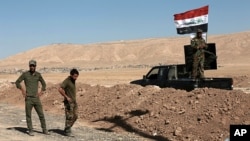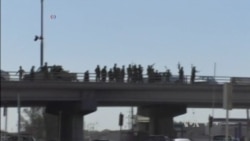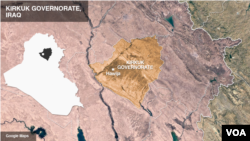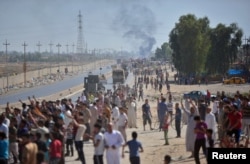Iraqi forces advanced rapidly through the northern reaches of the country Tuesday, recapturing territory and the two largest oil fields from Kurds, virtually ending their hopes for an independent state.
A day after seizing Kirkuk, a city of a million people, Baghdad's troops took back towns and the countryside, with the Kurds retreating without a fight.
The Bai Hasan and Avana oil fields accounted for about 250,000 barrels of production a day of the 650,000 the autonomous Kurdish region exported to finance its operations. Their loss deals an economic blow to Kurdish efforts to declare independence from the central government in Baghdad. Kurds voted in a referendum last month for a separate state, but Baghdad declared the vote illegal.
Iraqi oil minister Jabar al-Luaibi said Baghdad would now try to boost production at the Kirkuk oil fields to more than one million barrels a day.
The U.S. has trained both the Iraqi forces and the Kurdish Peshmerga fighters, aligning with them jointly in the fight against Islamic State jihadists. U.S. President Donald Trump said Monday that the U.S. has taken no sides as the balance of power shifts in northern Iraq.
WATCH: US Not Taking Sides in Iraqi-Kurdish Skirmishes
'Peaceful handover'
U.S. Army Colonel Ryan Dillon, a spokesman for the U.S.-supported coalition fighting Islamic State, said, “What we have seen is a peaceful handover of areas around Kirkuk. They handed over the keys if you will.”
He said that aside from a skirmish south of Kirkuk early Monday that claimed the lives of Iraqi forces and Peshmerga fighters after miscommunications at a Kurdish checkpoint, “there have been no further reports of armed conflict or contact between the two groups.”
He said U.S. military commanders are continuing to “monitor the situation, and our leaders, talking with counterparts in both the Iraqi Security Forces and the Peshmerga, urge all sides to avoid escalation. These tensions distract from our unified fight against ISIS, which remains a very real threat here in Iraq.”
A Yazidi group allied with Baghdad also took control of the town of Sinjar, with Kurdish forces leaving before dawn Tuesday. The Peshmerga also pulled out of the long-disputed Khanaqin region near the Iranian border.
The Kurds had taken control of the territory they yielded this week in the chaos following the Islamic State advance through northern and western Iraq in 2014. Now the jihadists have also lost much of the vast sweep of lands they claimed in Iraq and Syria, including Raqqa in northern Syria, once the self-proclaimed capital of their religious caliphate.
Iraqi flags raised
Tuesday’s developments followed a swift move by Iraqi government forces Monday to capture the Kirkuk governor's office, key military sites and an oil field. The U.S.-trained troops, acting on orders from Prime Minister Haider al-Abadi, raised Iraqi flags in place of Kurdish banners.
The U.S. Defense Department, which has supported the Iraqi forces and helped train Kurdish fighters in the battle against Islamic State militants, said Monday the Iraqi troop movements were “coordinated” with Peshmerga force withdrawals.
“We continue to support a unified Iraq. Dialogue remains the best option to defuse ongoing tensions and longstanding issues,” Pentagon spokesman Army Colonel Robert Manning told reporters Monday.
'Heavy price'
However, the Peshmerga said Baghdad would pay “a heavy price” for the “war on the Kurdistan people.”
When asked about the situation during a press briefing at the White House, Trump said the United States is remaining neutral, noting the “very good relationship” with the Kurds and that “we've also been on the side of Iraq.”
“We don't like the fact that they're clashing,” Trump said. “We are not taking sides in that battle.”
Carla Babb, Nike Ching, Michael Bowman, Serhan Akyildiz and Jeff Seldin contributed to this report.








